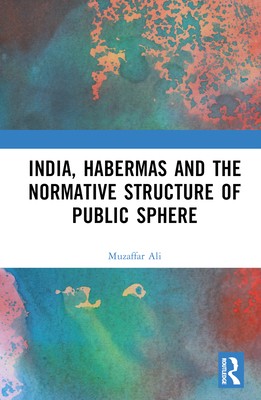
- We will send in 10–14 business days.
- Author: Muzaffar Ali
- Publisher: Routledge Chapman & Hall
- ISBN-10: 1032370998
- ISBN-13: 9781032370996
- Format: 15.6 x 23.4 x 1.1 cm, kieti viršeliai
- Language: English
- SAVE -10% with code: EXTRA
India, Habermas and the Normative Structure of Public Sphere (e-book) (used book) | bookbook.eu
Reviews
Description
The book examines how the contemporary Indian situation poses a strict theoretical challenge to Habermas's theorization of the public sphere and employs the method of samvāda to critically analyze and dissect its universalist claims. It invites the reader to consider the possibility of imagining a normative Indian public sphere that is embedded in the Indian context--in a native and not nativist sense--to get past the derivative language of philosophical and political discourses prevalent within Indian academia. The book proposes that the dynamic cooperative space between Indian political theory and contemporary Indian philosophy is effectively suited to theorize the native idea of the Indian public sphere. It underlines the normative need for a natively theorized Indian public sphere to further the multilayered democratization of public spheres within diverse communities that constitute Indian society.
The book will be a key read for contemporary studies in philosophy, political theory, sociology, postcolonial theory, history, and media and communication studies.
EXTRA 10 % discount with code: EXTRA
The promotion ends in 23d.11:10:11
The discount code is valid when purchasing from 10 €. Discounts do not stack.
- Author: Muzaffar Ali
- Publisher: Routledge Chapman & Hall
- ISBN-10: 1032370998
- ISBN-13: 9781032370996
- Format: 15.6 x 23.4 x 1.1 cm, kieti viršeliai
- Language: English English
The book examines how the contemporary Indian situation poses a strict theoretical challenge to Habermas's theorization of the public sphere and employs the method of samvāda to critically analyze and dissect its universalist claims. It invites the reader to consider the possibility of imagining a normative Indian public sphere that is embedded in the Indian context--in a native and not nativist sense--to get past the derivative language of philosophical and political discourses prevalent within Indian academia. The book proposes that the dynamic cooperative space between Indian political theory and contemporary Indian philosophy is effectively suited to theorize the native idea of the Indian public sphere. It underlines the normative need for a natively theorized Indian public sphere to further the multilayered democratization of public spheres within diverse communities that constitute Indian society.
The book will be a key read for contemporary studies in philosophy, political theory, sociology, postcolonial theory, history, and media and communication studies.


Reviews